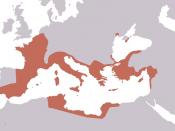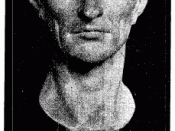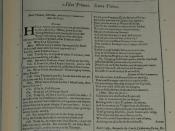Authors use literary devices in their works for a variety of reasons. The same holds true in Shakespeare's Julius Caesar. The use of these devices has an effect on the plot's development. Several literary devices can be seen in Julius Caesar, and they all have an effect on the plot.
Foreshadowing is a key literary device in the play. We see foreshadowing from the beginning of the play, when the Soothsayer tells Caesar to "Beware the Ides of March"ÃÂ in Act I, Scene I, which happens to be the day that Caesar is killed. Calpurnia later dreams of Caesar's death, but he does not heed her warning. this not only tells us what is going to happen, but it also shows us how Caesar's status and ego are getting to his head. Foreshadowing gives us a hint of what is to come, and can also reflect upon a character or characters.
A second literary device used in the play is the use of puns. A pun is another element noted early on in Julius Caesar. When Marullus addresses the Cobbler, the pun begins. Cobbler is meant to have two meanings in this dialog: 1 - a shoemaker and 2 - a bungler. The Cobbler refers to himself as a "mender of bad soles,"ÃÂ playing with the word "soles."ÃÂ Marullus interprets the Cobbler as a mender of "souls."ÃÂ The usage of puns adds some light humor to the play as well as reflecting on the characters of the play. This also shows that the so-called "upper class"ÃÂ can still be fooled by the "commoners."ÃÂ The usage of puns adds to the story of Julius Caesar.
During Antony's funeral speech, which is the climax of the play, several literary devices are used, including rhetorical questioning, sarcasm, and repetition.


